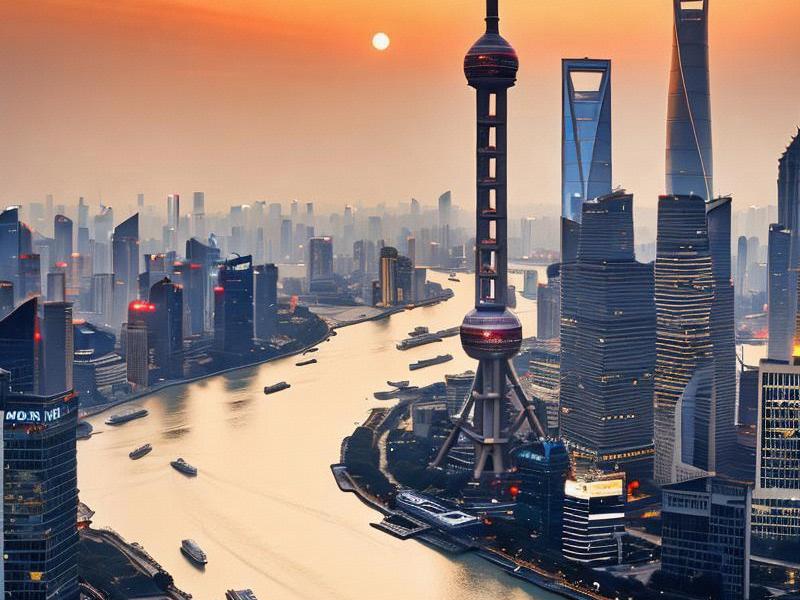
Shanghai, often referred to as the "Pearl of the Orient," stands as a beacon of China's economic and cultural prowess. As the largest city in China and one of the world's most populous metropolitan areas, Shanghai is a dynamic metropolis that seamlessly blends the old with the new. This article aims to provide an in-depth look at the various facets of Shanghai, highlighting its significance on the global stage.
Economic Powerhouse
Shanghai's economic landscape is a testament to its status as a global financial center. The city is home to the Shanghai Stock Exchange, one of the largest stock exchanges in the world, and the Pudong area, which has become synonymous with modern skyscrapers and financial institutions. Pudong, once a rural area, has transformed into a symbol of China's economic reform and opening up, featuring landmarks such as the Oriental Pearl Tower and the Shanghai Tower.
The city's port, the Port of Shanghai, is the busiest container port in the world, handling millions of containers annually. This underscores Shanghai's critical role in global trade and logistics. The presence of multinational corporations, foreign investments, and a robust business environment further solidifies Shanghai's position as a key player in the global economy.
Innovation and Technology Hub
In recent years, Shanghai has emerged as a leading innovation and technology hub in China. The city has invested heavily in research and development, fostering a vibrant startup ecosystem. Zhangjiang Hi-Tech Park, located in Pudong, is a prime example of this initiative, housing numerous high-tech companies, research institutions, and incubators.
Shanghai's commitment to innovation is also evident in its smart city initiatives. The city has implemented various technologies to enhance urban living, including intelligent transportation systems, digital governance, and smart energy solutions. These efforts aim to improve the quality of life for residents while promoting sustainable development.
夜上海最新论坛 Cultural Melting Pot
Despite its rapid modernization, Shanghai has managed to preserve its rich cultural heritage. The city is a melting pot of different cultures, reflecting its history as a trading port and cosmopolitan center. Traditional Chinese architecture coexists with modern skyscrapers, creating a unique urban landscape.
The Bund, a historic waterfront area, is a popular tourist destination, offering stunning views of the Pudong skyline. The area is lined with colonial-era buildings that serve as a reminder of Shanghai's past as a concessions hub. In contrast, the Yu Garden, a classical Chinese garden, showcases the city's deep-rooted cultural traditions.
Shanghai's cultural scene is also vibrant, with numerous museums, theaters, and art galleries. The Shanghai Museum, renowned for its extensive collection of Chinese art, attracts millions of visitors each year. The city's vibrant theater district, known as the Shanghai Theatre Arts Centre, hosts a wide range of performances, from traditional Chinese opera to contemporary plays.
Urban Development and Sustainability
Shanghai's rapid urban development has been nothing short of remarkable. The city has undergone significant transformations over the past few decades, expanding its infrastructure and improving living standards. However, this growth has also brought challenges, particularly in terms of sustainability and environmental impact.
上海娱乐联盟 To address these issues, Shanghai has implemented various measures to promote sustainable urban development. The city has set ambitious goals to reduce carbon emissions, increase green spaces, and improve waste management. Initiatives such as the construction of green buildings, the promotion of public transportation, and the development of renewable energy sources are part of Shanghai's commitment to sustainability.
The Huangpu River, which flows through the heart of the city, has also been a focus of environmental efforts. Cleanup projects have improved water quality, and the riverbanks have been transformed into scenic areas for residents and tourists alike.
Global Influence and Soft Power
Shanghai's global influence extends beyond its economic and technological achievements. The city has become a symbol of China's soft power, showcasing its culture, values, and aspirations on the world stage. Events such as the Shanghai International Film Festival, the Shanghai World Expo, and the Shanghai Fashion Week attract participants and audiences from around the globe, enhancing the city's international profile.
Shanghai's role as a cultural and educational hub further strengthens its global influence. The city is home to prestigious universities and research institutions, attracting students and scholars from all over the world. These institutions contribute to the exchange of knowledge and ideas, fostering international collaboration and understanding.
Challenges and Opportunities
爱上海 While Shanghai has achieved remarkable success, it also faces several challenges. Rapid urbanization has led to issues such as traffic congestion, housing shortages, and environmental degradation. The city must continue to innovate and adapt to address these challenges while maintaining its momentum.
One of the key opportunities for Shanghai lies in its ability to serve as a bridge between China and the rest of the world. As globalization continues to shape the world, Shanghai's strategic location and well-developed infrastructure make it an ideal platform for international cooperation and exchange.
Conclusion
Shanghai's journey from a small fishing village to a global metropolis is a story of resilience, innovation, and cultural richness. The city's unique blend of tradition and modernity, coupled with its economic prowess and cultural vibrancy, makes it a fascinating subject of study. As Shanghai continues to evolve, it remains a vital player on the global stage, shaping the future of China and the world.
In conclusion, Shanghai stands as a testament to the potential of urban development and the power of cultural exchange. Its achievements in economic growth, innovation, and sustainability serve as a model for other cities around the world. As we look to the future, Shanghai's story will undoubtedly inspire and inform the next chapter of global urbanization.
